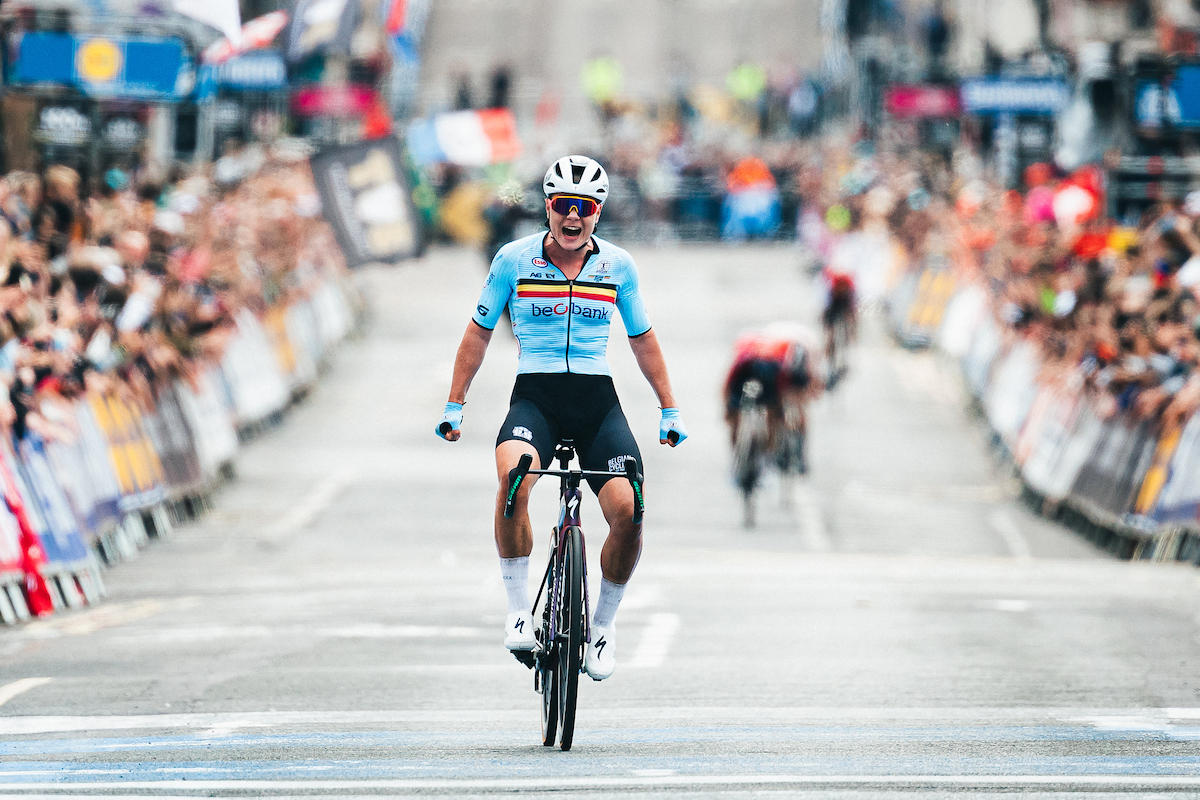
The 2023 UCI World Championships was the first edition of the 'Super Worlds', the bringing together almost all of the cycling disciplines except for cyclocross and gravel. Over the course of 10 days in Glasgow and across Scotland, over 200 rainbow jerseys were awarded.
This year, the UCI Road World Championships was six weeks earlier than usual, in close proximity to the Tour de France and Tour de France Femmes. As such, the elite men's road race, usually the closing event, took place on the first weekend while the elite women's road race concluded the unified Worlds.
Typically held in the late winter, the UCI Track World Championships were shifted to late summer – a timing adjustment that will help with preparation for the Paris Olympic Games in 2024.
A unified World Championships will be held every four years to coincide with the Summer Olympic Games cycle. In 2027, the next combined championships will be held in Haute Savoie, France.
Were the Cycling Super World Championships a success? That has still to be decided. However the event sparked lot of excitement, great racing, polemics and so debate.
Cyclingnews brings you our six major talking points from the 2023 UCI Cycling World Championships.
The Glasgow circuits revealed the best riders
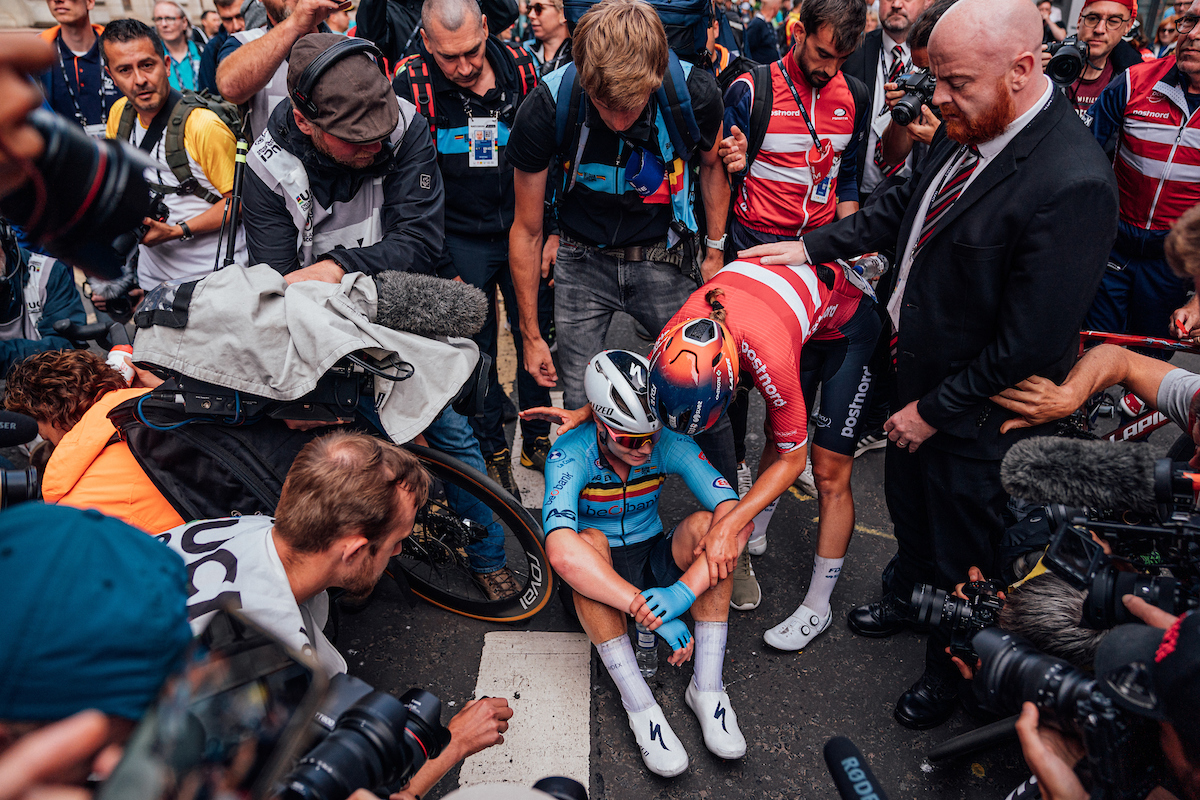
Before the Road World Championships, riders looked at the crazy Glasgow circuits and couldn't believe what they were seeing. There were over 45 turns per lap - some counted 48 - and numerous short, steep hills and fast, technical turns.
The organisers were accused of designing a 'criterium World Championships'. If that's the case, Mathieu van der Poel (Netherlands) and Lotte Kopecky (Belgium) are very good at criteriums and a lot more.
Thanks to some luck with the weather, the many corners and the city centre course didn't spark too many egregious crashes. The under-23 men's race was the sole exception. Even there, Axel Laurance (France) had already shown himself to be a huge talent before claiming the rainbow jerseys.
Were the road races too hard? Seeing the faces of the riders after each event, it was clear that the athletes had to absolutely bury themselves to win medals in Glasgow. The selections were based purely on power, bike skills and the will to go beyond one's limits.
Cecilie Uttrup Ludwig said she "lost count of how many times I vomited", Tadej Pogačar had to excuse himself after his bronze medal-winning sprint, and rider after rider collapsed in a heap after the finish line.
Wout van Aert's only criticism of the course was how hard it was to come back from a crash or mechanical.
"I understand the critics, but I also think that the world championships has a different course every year, so a lot of riders have an opportunity during their careers. A city circuit like this is definitely something that deserves to be in," he concluded
Unified and August Worlds complicated amid a crowded women's road calendar
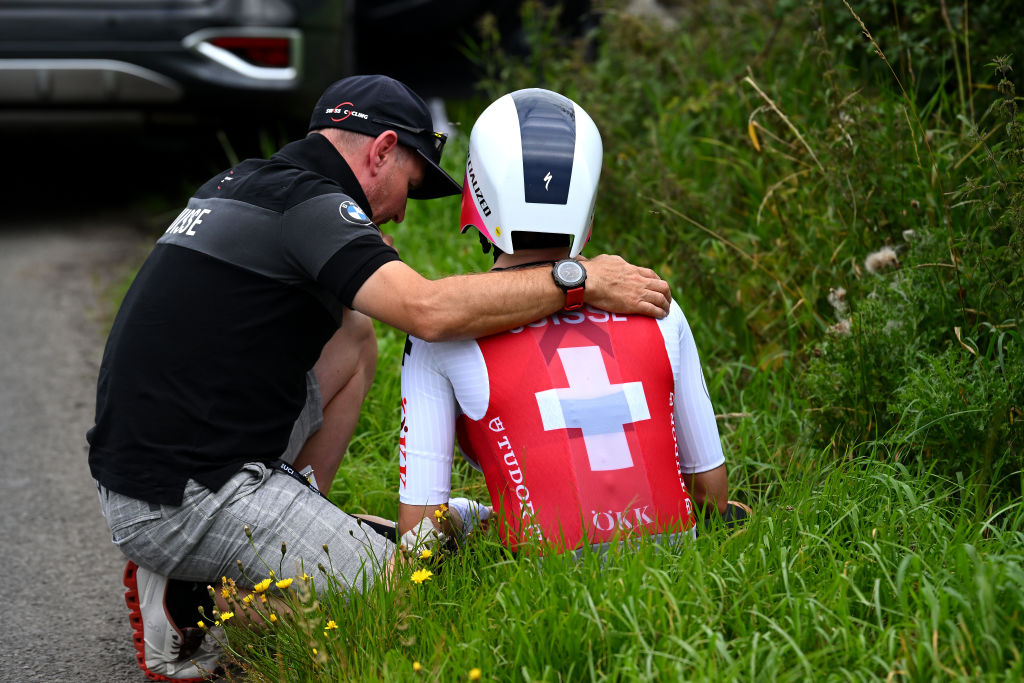
Marlen Reusser's surprise abandon midway through the elite women's individual time trial in Stirling was all the evidence needed to show the women's calendar needs a rework.
Reusser cited the fatigue of targeting the Spring Classics, then having the La Vuelta Femenina hardly one week later, followed closely by the Itzulia, Vuelta a Burgos, Tour de Suisse then Tour de France Femmes.
Road race podium finishers Demi Vollering and Cecilie Uttrup Ludwig praised the Swiss rider for speaking out, emphasising that riders need time to balance training and racing, and enjoying life outside of the sport. Only new World Champion Lotte Kopecky seemed unfazed by the year, having skipped La Vuelta Femenina and the Giro d'Italia Donne before the Tour de France.
If a rider of the fortitude of Reusser struggled with the calendar, that sends a message to the UCI that the unified World Championships have to be more carefully considered in its placement amid the road season, as does the whole racing calendar.
While a rider like Kopecky can time her peak around the road and track, the same privilege isn't awarded to all riders. Women's WorldTeams are smaller than the men's, and the strain is showing.
The other disciplines like track and MTB are less affected by the unified Worlds because their competitions are more spread out, but the women's WorldTour riders scarcely had time for a breather before Glasgow and it showed.
"It's not necessarily been the number of races but the way it's organised," Australian Grace Brown told Cyclingnews.
"It's really heavy in some parts of the year and then lacking and others. It's been really big races up until now and then until the end of the year, it's just a random assortment of what's left.
"I feel like [the calendar] doesn't have a good structure and needs a little bit of a rework especially so that riders can phase their racing and target their specialties a bit better rather than just skipping from one race to the other and always being on this same sort of level."
Australian director Matt White expects the calendar to change in 2024 with the Olympic Games coming in late July.
Already the Tour de France Femmes has been announced for August, after the Olympics, and there are rumours La Vuelta will be in a new position rather than directly after the Classics. The Giro Donne is on the schedule for July, but White says it could also move to later in the season.
"I agree with Grace that a little bit more spacing between the races will certainly help the planning of the athletes for their peak condition."
The same may not be said for the men, who have had the same type of calendar for their entire careers and have bigger teams to cover the races.
Remco Evenepoel, after winning the elite men's time trial, noted that the proximity to the Tour de France was beneficial for the road race where, in Tokyo, most of the top 10 finishers raced the Tour, but it was not the case for the ITT, where the podium was made up of riders who did not do the Tour.
"It looks like in the TT you need fresh legs but in the road race, you can really use the endurance from the Tour de France. It's not a secret anymore that a Grand Tour is not bad for a one-day race," Evenepoel said.
One peak for multi-discipline riders a benefit

The combined World Championships put the various Olympic disciplines on the same schedule ahead of the Olympic Games, which is a vast improvement on previous years, where the Track Worlds and Olympics were held in the same year, around five months apart.
That meant that riders had to plan their year around a first peak to qualify for the Olympics, then a second peak for the Games themselves.
Lotte Kopecky, winner of the Points and Elimination Races on the track [and road?] said the new dates help ease the stress.
"I like it - now it's one peak and I can combine both, otherwise it's stretching the season to the end of October. It makes it less mentally harder than it was."
The combined Worlds make it somewhat easier for the multi-discipline riders like Filippo Ganna, Chloé Dygert and Kopecky, who were able to find success on the track and also be competitive in the road events.
Kopecky said, after winning her third rainbow jersey in the road race, that she approached the combined Worlds with careful attention to how her body felt.
"I train myself to listen to my body and how it feels and I found a really good balance between training and having more fun off the bike."
The UCI made their priorities clear
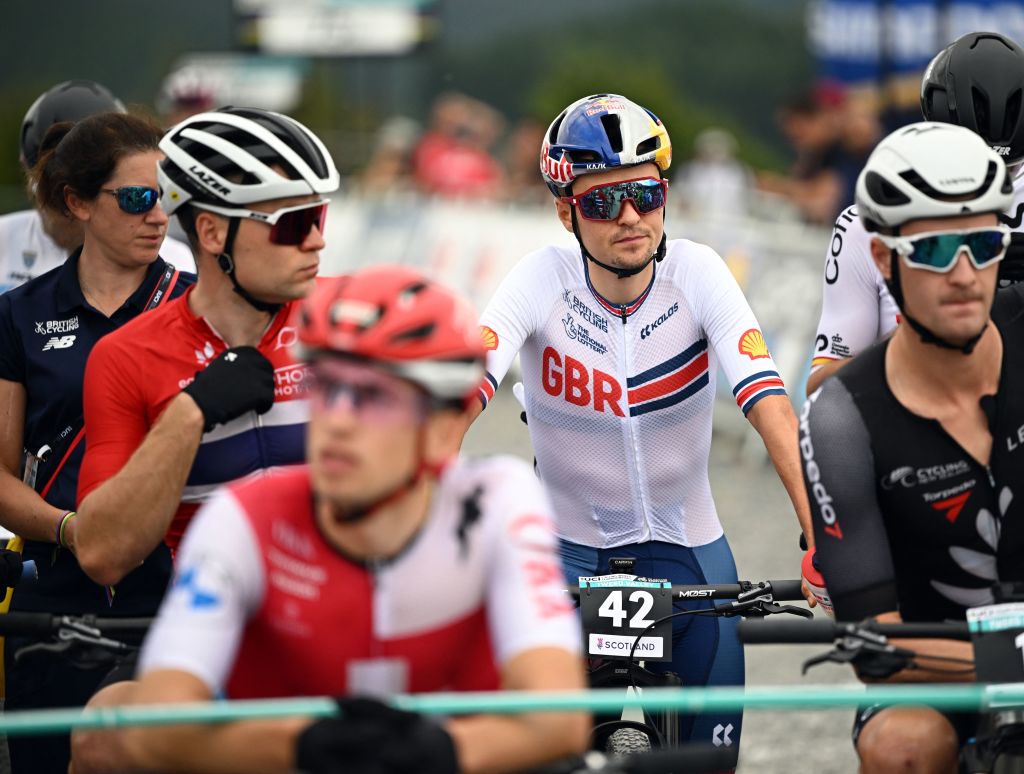
In bending the rules to put Mathieu van der Poel, Tom Pidcock and Peter Sagan on the fifth row ahead of where their UCI ranking would have placed them, the UCI Sport Director Peter Van Den Abeele made it clear where the federation's priorities lie, and it's not on the athletes who race mountain bikes all season.
The start list remained the same despite a public protest from a long list of the season-long mountain bike racers, with Pidcock adding his support after winning the world title and described the rule change as a 'shit show.'
"Hours before the start of the World Championship is not an appropriate time to selectively search for rules and we therefore express our deep disappointment and frustration at this situation caused by the UCI," the riders stated.
It may not be the UCI's official press officer position, but Van Den Abeele told the Belgian press that concerns over mountain bike's continued inclusion in the Olympic Games, and the prestige brought by high-profile stars like the aforementioned riders, were behind the decision.
That seems unfair when most other riders have to fight all season for qualifying points, especially with Olympic qualification part of the process.
Belgium show their road racing talents despite Wout Van Aert's silver medal
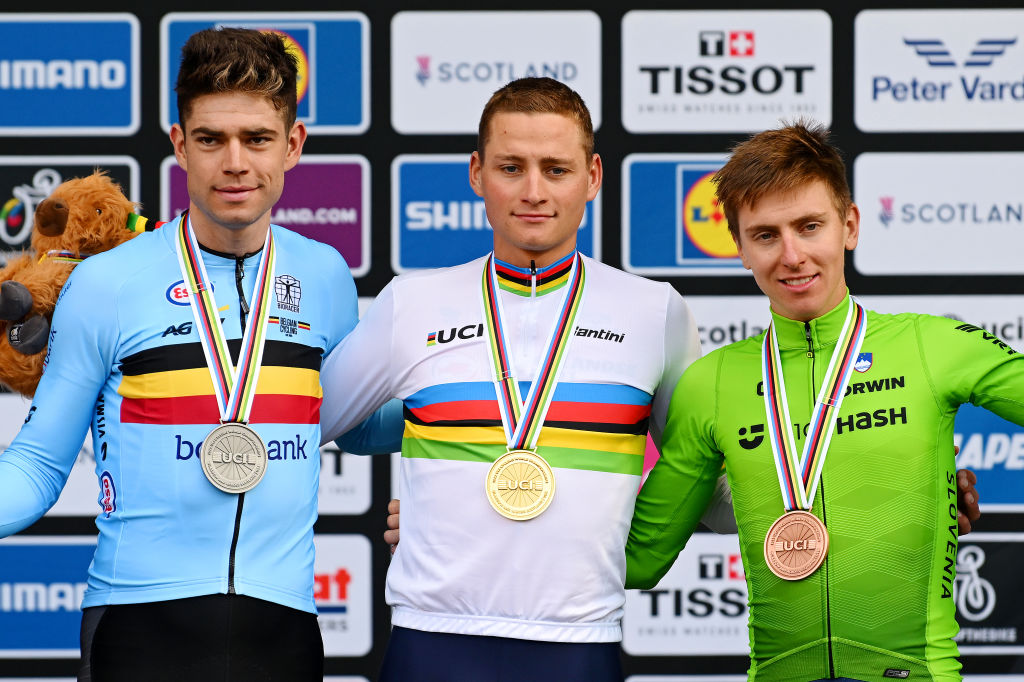
In the mixed zone following the men’s road race finish, Jasper Stuyven responded to a question about where Belgium went wrong in the men's road race with a hint of outrage.
“I think it's more you guys who are looking at the strong Belgian team in a negative light,” he replied.
With a silver medal and three riders in the top 10, Stuyven certainly had reason to question any suggestion of disappointment. Yet, so strong was the Belgian performance on the road across the elite races thanks to Remco Evenepoel and Lotte Kopecky, that Wout Van Aert’s silver medal in the elite men’s road race and another defeat to Mathieu van der Poel stands out.
The future looks bright for Belgium in the lower age categories too, with Alec Segaert and Julie De Wilde taking silver and bronze in the under-23 men’s and women’s time trials, leaving Belgium atop the road medals table but without Van Aert in a rainbow jersey.
France have the greatest cause for optimism for the future, with Julie Bego (France) winning the junior women’s world title ahead of British race favourite Cat Ferguson and then Axel Laurence taking the under-23 men’s road race title. France will certainly be pleased to be cultivating the stars of tomorrow.
Host nation Great Britain celebrated topping the track medals table but missing out on a world title in the road events left them down in 11th in the road medals table. It’s a position that perhaps doesn’t do justice to excellent young talents who narrowly missed gold - such as Ferguson, Josh Tarling and Ben Wiggins but reflects the current state of British road racing.
After such a heavy medal haul, Belgium will head to the 2024 Road World Championships in Zurich with high expectations, while Great Britain will have a point to prove.
The combined Worlds are too big to handle
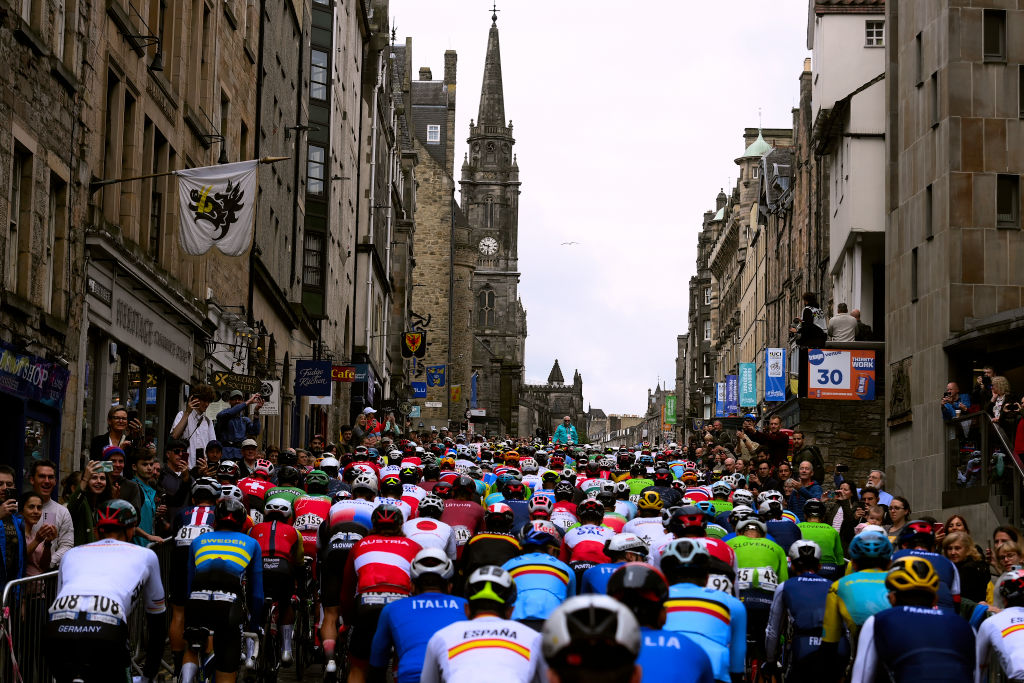
Glasgow proved to be gracious hosts for the road events but the mass closure of the city centre for a huge variety of events for the road and para road races was tough on the local businesses.
In the first days of the Worlds, the local taxi drivers staged a strike complaining that the road closures were preventing them from working, despite a months-long campaign by Get Ready Glasgow to ensure there were minimal disruptions.
Residents near the finish in Stirling, where the individual time trials were held, complained that they couldn't leave their homes for days, that car parks at the local shopping centre were closed, and that the town's main tourist attraction, Stirling Castle, was closed for the duration, although Historic Environment Scotland noted there were shuttles.
The Gran Fondo events had to be re-routed after residents of Perth protested against the closures that would have meant lengthy detours.
The breadth of competition is so large it was impossible to write all of the fascinating stories that could have come out of the Super Worlds.
Hosts of a combined World Championships will need a very specific combination of venues and it's feasible that the UCI will struggle to find hosts.
At the very least, the residents and local organisers of Haute Savoie, France, who will hold the 2027 combined championships, will have been looking closely at the positives and negatives for Glasgow.







